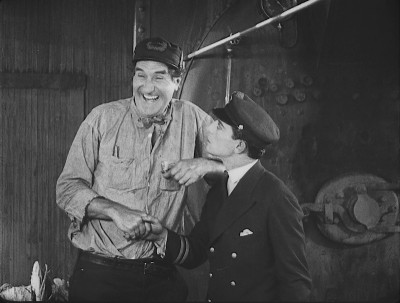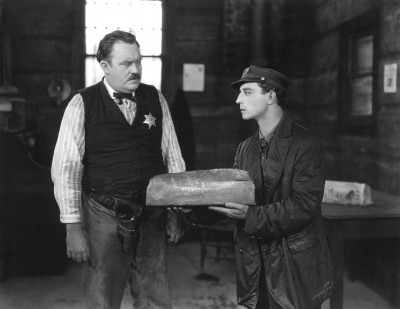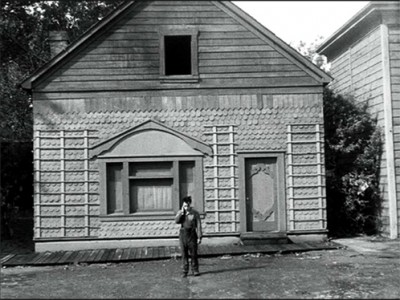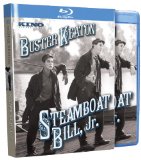| Reviews & Columns |
|
Reviews DVD TV on DVD Blu-ray 4K UHD International DVDs In Theaters Reviews by Studio Video Games Features Collector Series DVDs Easter Egg Database Interviews DVD Talk Radio Feature Articles Columns Anime Talk DVD Savant Horror DVDs The M.O.D. Squad Art House HD Talk Silent DVD
|
DVD Talk Forum |
|
|
| Resources |
|
DVD Price Search Customer Service #'s RCE Info Links |
|
Columns
|
|
|
Steamboat Bill, Jr.
Kino // Unrated // July 6, 2010
List Price: $34.95 [Buy now and save at Amazon]
The Movie:
The last film that Buster Keaton made as an independent filmmaker, Steamboat Bill Jr. has been released in high definition on a lovely Blu-ray disc from Kino. The story of a steamboat captain and his effete son is a simple tale that builds to a riotous conclusion and includes a hilarious, and dangerous, stunt that has become a classic. The Kino disc looks and sounds great, and will be a wonderful addition to any film library.
Buster Keaton was born into a vaudeville family and started appearing on stage with his parents at the age of three. When he started working in film with Roscoe Arbuckle in 1917 at the tender age of 22, he was already a seasoned professional. By 1920 he had his own film studio, financed by Joseph M. Schenck, and until 1928 turned out an amazingly funny series of shorts and feature films. In 1928 however the film world was changing. The cost of movies was growing rapidly and

Steamboat Bill Jr., Keaton's last independent feature, starts off a bit slow but when the comedy shifts into gear the movie fires on all cylinders. William Canfield (Ernest Torrence), known as Steamboat Bill to everyone, runs an old riverboat, The Stonewall Jackson, out of a small city on the Mississippi River. John James King (Tom McGuire) already owns the bank, the hotel, and much of the rest of the town but when he buys a new, fancy riverboat to compete with Bill, things look grim for the old river rat.
Bill does get some good news when he hears that his son, William Canfield Jr. (Buster Keaton) is coming home from college. Bill Sr. hasn't seen his son since he was a baby, but not maybe the college graduate can help in the battle between the two steamboats. All ideas of Junior being an asset fly out the window when the rough and sturdy Steamboat Bill sets eyes on his small, weak son. Wearing an effeminate beret, sporting a weak mustache, and carrying a ukulele, Bill Jr, is just the opposite of when his father was expecting.

After getting a new set of clothes (and having the mustache shaven off) Bill Junior runs into a girl he knew in college, Kitty King (Marion Byron) daughter of his father's rival. Though the two youngsters hit it off, both fathers try to keep them apart, This only intensifies the competition King even resorts to having The Stonewall Jackson condemned and getting Bill Sr. thrown in jail.
This is a fun, wild film, with a few minor problems. The biggest flaw is that it takes a while for the action to get started. The first reel is establishing the plot and there are few laughs. When Bill Sr. goes looking for his son at the train station, knowing only that he'll be wearing a white carnation, the gag is pretty predictable and doesn't play quite as well as it could. Soon after, when Buster gets on the screen, the movie takes off and doesn't look back. The scene where Buster tries to calm a crying baby by singing and dancing is hilarious, especially since his father is watching but doesn't see the infant and just thinks his son is insane.

The end of the movie where a cyclone hits is great, and clips are often shown in documentaries on silent comedies. This movie includes the justifiably famous scene where Buster stands in front of a house while the whole front façade falls on him. He's unharmed because he's perfectly aligned with an open attic window, which he passes through safely. In reality the façade weighted thousands of pounds and it's been reported frequently that the margin of error was only two inches. The cameraman kept his eyes closed, but the camera rolling, since he couldn't stand to see his boss possibly killed. That's the highlight, but the rest of the cyclone sequence is just as impressive.
While the ending is wonderfully fun, for my money the best sequence in the film is the jail scene. Junior arrives at the hoosegow where his father is being held with a comically long loaf of bread that's obviously hiding something. Bill Sr. is disgusted with his son however, and won't take the loaf which leads the panicked offspring to try to communicate what the contents are without the jailer catching on. It's a wonderful sequence that works very well and had everyone in my family laughing steadily.
The Blu-ray Disc:
Video:
The MPEG-4 AVC 1080p image (untinted) is marvelous. This Blu-ray disc easily bests the other home video releases of this movie. The first thing that strikes viewers is the increased amount of detail in the picture. The finest lines are strong and well defined, such as the wrinkles on Buster Keaton's thumb during a close up of his hand holding a train ticket. For and 80+ year old movie the detail, contrast, and overall quality is amazing. That's not to say that the transfer is perfect. There are some very minor complaints, none of which ruin the presentation. The blacks are generally fine, but not as deep as they could be. The title cards especially could be a little darker. Some of the outside scenes are just a tad too bright, and some highlights are a bit on the harsh side. There are some print defects, some white spots and a few scratches, but these are fairly uncommon. There's a natural amount of grain, which Kino wisely left along. That gives the movie an authentic feeling that makes you feel like you've been transported back to an old movie theater.
Audio:
There are three audio tracks offered, a newly recorded DTS-HD 5.1 track by the Biograph Players which is also available in DD stereo and an organ score by Lee Erwin. This final option was my favorite, though a lot of that had to do with personal taste. The Biograph players are a talented group of musicians, but their score wasn't one of my favorites. There were a few times that the music pulled me out of the film, such as when they used the funeral march when showing Steamboat Bill and his mate listening to John King's speech ragging on Bill's ship. I thought it was an odd choice, since it was obvious that Bill wasn't about to give up just because there was formidable competition. Some of the added sound effects were mixed a little too high and weren't as subtle as I would have liked. These aren't major complaints, and it certainly wasn't a bad score by any means. It just wasn't a favorite of mine.
Extras:
Kino has included some nice extras. First off there's a second version of the film created entirely from alternate takes and camera angles. This print was softer in general but still looked nice. It is great for Keaton scholars and die-hard fans like me, but there is little real difference between the two versions.
The disc includes a 12-minute featurette on the making of the film, including comparisons between the two versions, a stills gallery, and a reel of pratfalls entitled Why They Call Him Buster. The disc is rounded out by a pair of old recordings of the song "Steamboat Bill."
Final Thoughts:
Steamboat Bill Jr. isn't Keaton's greatest movie, but it is a great film that looks fantastic on Blu-ray. A wonderful movie and an outstanding image. What more could you want? Highly Recommended.
Note: The images in this review are not from the Blu-ray disc and do not necessarily represent the image quality on the disc.
|
| Popular Reviews |
| Sponsored Links |
|
|
| Sponsored Links |
|
|
| Release List | Reviews | Shop | Newsletter | Forum | DVD Giveaways | Blu-Ray | Advertise |
|
Copyright 2024 DVDTalk.com All Rights Reserved. Legal Info, Privacy Policy, Terms of Use,
Manage Preferences,
Your Privacy Choices | |||||||















